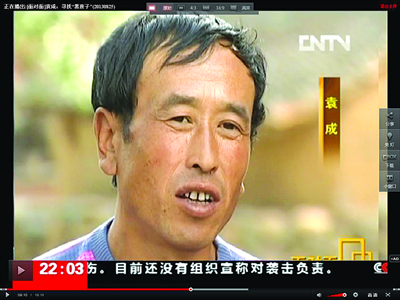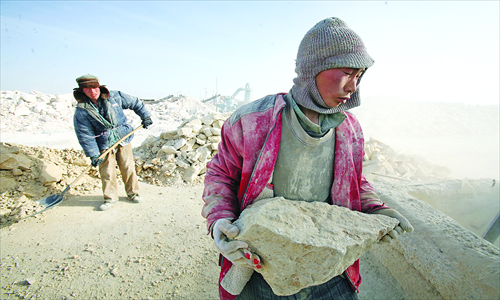Endless quest for enslaved children

Yuan Cheng, a farmer from Hebei's Fengning county who has been searching for his son for six years, gives an interview. Photo: CCTV-NEWS
Each time the phone rang, Yuan Cheng would rush to pick it up. But to his disappointment, for over six years, the voice on the other end was never who he hoped it would be.
Yuan, 44, a farmer from Xiwopu village, Fengning county, North China's Hebei Province, will never forget the date of March 28, 2007. That was the day his 15-year-old son Yuan Xueyu went missing from a construction site in Zhengzhou, Henan Province.
Since that day, Yuan, believing his son was kidnapped and confined as a slave worker at illegal brick kilns or coal mines, has begun an arduous journey to get him back.
Over the past six years, Yuan has visited hundreds of such workshops in provinces like Henan, Shanxi and Hebei. Through his reports and assistance, scores of people, most of them minors or disabled, were rescued from sweatshops. But Yuan's son was not among them.
Despite the long delay, he, his wife and 12-year-old daughter have never given up. "It's not easy to put it aside. He must be still waiting for me to rescue him. I will continue as long as there is a glimmer of hope," Yuan told the Global Times, adding that he frequently dreams of his son being abused and beaten.
Missing children
As the 2007 winter holidays began, Yuan Xueyu, a junior high school student at the time, told his family he wanted to drop out of school and find a job.
After lengthy pleas by his son, Yuan Cheng finally relented. In the countryside, parents often send teenagers who struggle in school out to work.
On March 13, 2007, Yuan Xueyu left home with some friends to find his fortune as a window installer for a private contractor in Zhengzhou.
After arriving, he called home every two days, telling his family that his job and life were OK. Two weeks later, he disappeared. Colleagues said they did not see him return after he went to fetch a tool from a nearby flat. When seeking help from the local police, Yuan's friends were told he was most probably kidnapped to work in illegal kilns.
Yuan Cheng rushed to Zhengzhou after hearing the news. However, no clues were discovered despite a citywide search. Yuan was skeptical about the police's assumption until his son's colleague had a horrible encounter in the city two weeks later.
On the way back to his dormitory, while walking by a minibus, the boy was suddenly dragged into the vehicle, his head was covered with a black bag and a knife was pressed against his stomach. The van later stopped near Zhengzhou train station but thanks to a moment of distraction from his kidnappers, the young man was able to escape.
After this, Yuan firmly believed that his son was kidnapped.
"If I was a bit tougher about him leaving, it wouldn't have happened," Yuan lamented. "My family was poor, and my wife and I thought his work would help relieve our poverty."
Search begins
Since then, Yuan has begun searching illegal black kilns all over the country for his child. Soon, he found that he was not the only unlucky parent.
After putting up Lost notices, five more families joined Yuan, as their children all disappeared in the same month in Zhengzhou, including Tao, a mother whose 15-year-old son Zhao Haiyang went missing on the way to school.
The search quickly achieved initial success. In early May, Zhao was found in a brick kiln in Jincheng, Shanxi. After agreeing to help a stranger carry a box, Zhao was stuffed into a van. He was first taken to a brick kiln in Jiaozuo, Henan. A week later, after a failed escape attempt, he was sold to another brick kiln owner in Jincheng.
To Yuan's joy, when showing them a picture of his son, some workers in a brick kiln in Shanxi told him they had seen the boy but he was transferred by a contractor days before. However, the joy was soon quenched as the contractor denied any knowledge of his son when questioned by Yuan and the police.
The search attracted wide media attention and more families reported that their children had gone missing, which soon triggered a response from the central government. On June 26, 2007, the country launched a nationwide campaign to crack down on illegal employment.
By July 30, 277,000 employers were inspected in the crackdown, with a quarter of them being discovered to have no operating license. The campaign saw 1,340 slave workers rescued, 367 of whom were mentally disabled, and 147 people were detained.
In Shanxi, 13 brick kilns were found using 15 child laborers with the youngest being only 13.
In Henan, within four days, 29 child slave workers were rescued.
While some families celebrated their children's return, there was no news for Yuan. "Five other families found their children one after another but not mine," Yuan said.
Gradually, the media coverage decreased as the campaign ended, but Yuan continued his search unabated. Each year, bringing food to help make connections, he spends several months making inquiries and visits to different small workshops.
"If I hadn't been a witness, I could have never imagined the startling scene," he said, referring to the working conditions he saw in those workshops. Yuan describes these slaves as shabbily dressed, thin, bruised and with glazed over, faraway expressions.
Most black workshops were in remote areas and closely guarded. While some bosses took pity on him and allowed him to step into their plants, many were cautious and chased him away. Nevertheless, he still tried every means to get close to the workers, such as sneaking in or pretending to be a brick buyer.
By negotiating with the bosses or with help from the police, he has managed help free scores of workers.
During one rescue effort in Shanxi's Yuncheng, he was chased by over 10 thugs with sticks and stones when his attempt to take away three child laborers was discovered. With one leg injured by a thrown rock, he made his way to the police, who raided the illegal kiln and rescued the children.
Hope rekindled
In the past six years, he has spent over 100,000 yuan ($16,340) in his search, earned by farming, doing odd jobs or donations.
"After the national crackdown, the illegal workshops have largely been reduced. The majority of the factories I visit now are legal. The phenomenon of forced labor is dwindling but still exists," Yuan said, stressing that many sweatshops went further underground, making it more difficult to find them.
Upon hearing any news, they respond immediately, transferring the laborers, hiding or even killing them, according to Yuan.
"The national policy and regulations are complete but the local law enforcement is poor," Yuan said.
In recent years, slave workers have only sporadically been reported on. In September last year, Wu Jianbing from Xiaogan, Hubei Province, found his mentally disabled brother enslaved at a car wash in Tianjin.
In late 2010, 11 workers, including eight mentally disabled, were found to be working in appalling conditions at a building materials factory in Toksun county, Xinjiang Uyghur Autonomous Region.

Two reportedly enslaved men work at a building-materials factory in Toksun county, Xinjiang Uyghur Autonomous Region. Photo: CFP
Of late, Yuan has received several calls from people inquiring about the whereabouts of illegal workshops or asking to join him.
Guo Ruizhi, 50, from Linyi, Shandong Province, contacted Yuan to join him in searching after reading Yuan's story in the newspaper. Guo's son went missing in March 2006 in Guangzhou, at age of 16.
"The government and society pay a lot of attention to baby trafficking, but not to the left-behind relatives like Yuan and me," Guo told the Global Times, adding that there are still many parents whose older children are being taken. "We have to depend on ourselves," he said.
Some people even try to swindle money from the desperate parents. Occasionally, Yuan received calls from people saying they knew the whereabouts of his son but they all turned out to be conmen. "Still, I dare not to miss any chance. What if it's true?"
Those who saw their children returned thanks to Yuan's help rarely stay in touch, with only a few volunteers visiting him regularly.
"He is a good man and a great father who has persevered for such a long time," Xin Yanhua, an education consultant in Zhengzhou, told the Global Times. She voluntarily worked as a trustee between families whose children went missing and rescuers like Yuan in 2007.
Xin feels sorry for Yuan as many families have not shown him any gratitude.
"It doesn't matter whether they remember me or not. Those kids have returned to a normal life, that's enough," Yuan said.
Today, the biggest trouble for Yuan is that he hasn't a clear road map in mind except for repeated visits to regions like Henan and Shanxi where illegal workshops used to thrive.
Before, his wife used to turn to a fortune teller, who would give them directions, before he set off. Besides, they often burned incense and prayed. But now, the family has turned away from these rituals.
"We rarely do it anymore. The gods didn't show mercy. Such superstitions are just for comfort," he said.
Dou Jiangming, who has organized donations for Yuan, keeps updating inquiries to the police in Zhengzhou about the search for Yuan's son on his microblog.
"It's been 2,345 days since Yuan Xueyu went missing. Zhengzhou police, how's the case going?" Dou said in a latest post to the official microblog of the public security bureau in Zhengzhou.
"I also have inner contradictions. I'm not sure whether it's correct to do what I'm doing. On one side, I'm worried it will pressure Yuan to keep on searching. On the other, I'm clear that his individual effort will likely be in vain," Dou, who uses a photo of Yuan Xueyu as his blog's image, told the Global Times.
When asked what if his son might no longer be alive, Yuan falls silent.
"I have thought of it. But…there is always the possibility he is alive. I won't stop even if I am no longer able to walk," he muttered after a long pause.
A recent call from Hunan Province has given Yuan some new hope, with the caller saying he had met a boy resembling Yuan's son. Apparently, the boy together with several other children was spotted performing acrobatics in towns across the northern part of the province last April.
Feeling both excited and nervous, Yuan got busy contacting some parents and local police. He will soon set off for a new search, hoping that luck goes with him this time.